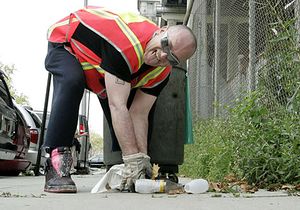UnNews:Special report - Boy George
31 March 2009
Boy George burst forth onto the UK music scene way back in 1982, accompanied by his reggae-tinged pop band Culture Club and instantly courted controversy with his androgynous style. In the early 80s, the topic of homosexuality was still considered taboo by most sections of society, but George's rumoured sexual preferences did not stand in the way when Do You Really Want To Hurt Me?, released September the 21st, became a massive hit and propelled the album from which is was taken - Kissing To Be Clever - all the way to No.5 in the British charts and 14 in the US Billboard chart. The single itself was a No.1 hit in Britain and reached second place in the USA.
The band went on to release a total of five albums, of which three went platinum (the second album, Colour By Numbers, four times over), along with a string of further hit singles and six compilation/best of collections. Remarkably, despite this success, the band lasted just four years before splitting in 1986; perhaps because the other members were tired of getting little or no press attention as all cameras were trained on their flamboyant front man.
Everyone was certain that Boy George, (Born George O'Dowd in 1961), would become massive as a solo artist; and he didn't let his fans down - he became enormous. Unfortunately, he did so only in terms of physical bulk, developing an impressive distended beer gut once he'd got his de rigueur 1980s new romantic heroin addiction out of the way - a change recorded with typical journalistic integrity and panache by the United Kingdom's Sun newspaper under the headline Boy Gorge, which stated that the singer had turned into a karma cha-MEAL-eon, an example of the rapier wit which has ensured the puplication enjoys the highest circulation of all British newspapers and a reference to Culture Club's 1984 record Karma Chameleon. Perhaps it was shame at his unfit appearance that led the narcissistic George to retreat from public life. He attempted a less high-profile career as a club DJ, riding on the shirt-tails of the house music scene which exploded in Europe in the late 1980s; but by-and-large he vanished, resurfacing only occasionally in the news at the centre of a new scandal. His arrest for possession of heroin was one such example in a police operation that also netted ex-band mate Jon Moss and ex-lover Marilyn, a transvestite who, despite fleeting success, is now just one of the unremembered faces with a funny haircut in the Band-Aid video (the one where Bono from U2 has a mullet). Futher legal trouble came in 1995 when Kirk Brandon, of long-and-thankfully-forgotten new wave band Theatre of Hate, attempted to sue George who he said had falsely claimed the pair had been romantically involved in the past. The court found in favour of George on this occasion, declaring that Brandon "loves the cock". However, Brandon declared bankruptcy and George was forced to pay £60,000 legal fees. In 2005, he was arrested and charged with possession of cocaine but this was later changed to a charge of falsely reporting a burglary - this would have incurred no more punishment than a fine of $1000, which any pop star with as illustrious a past as George's (especially one who can afford to be addicted to Bolivian marching powder) would doubtless have been able to afford, along with a paltry five days of community service. Unfortunately, he had decided to save money, preferring to go with $10 an hour lawyer Lee Galhack rather than paying more for someone who would in all certainty have got him off the hook. Galhack advised George not to attend court - advice which the singer took and paid for when an arrest was issued for him.
Once again, he dropped out of the news and vanished from the public eye. He became intensely private, emerging to DJ at clubs only when funds ran low and he needed to earn money in order to maintain the constant - if his ballooning girth is anything to go by - supply of pies that he had used to replace his addiction to illegal drugs. "It was a very dark time for George," say friends. "He's just a guy with an addictive personality. To go cold turkey, he needed to replace one addiction - heroin - with another. At one time, he was spending $400 a day on drugs and the only way he could stop was to switch his dependence to something else. Unfortunately, he chose pies. $400 worth of pies a day has a bad effect on a guy."
Perhaps, as he approaches his 50th birthday, it will soon be time for Boy George to settle down, to grow old gracefully - after all, many gay men are characterised by a great concern on how they appear to others, and no self-respecting homosexual wants to end up as a sad old mascara-wearing joke like drug-addled geriatric alcoholic Keith Richards. But not yet - George had one more controversy up his sleeve, ready to bring the press flocking as his celebrity faded like the wallpaper in your grandmother's bathroom. In 2008, he was convicted at Snaresbrook Crown Court - situated in a run-down corner of London soon to be demolished to make way for the 2012 Olympic Village - of the assalt and false imprisonment of a younger man named Audan Carlsen. Though his lawyer tried to convince the court that the star was now simply too obese to carry out such an attack, the court was not convinced and sentenced George to 15 months in prison. Though initially sent to HMP Pentonville, a Category B prison in London, he was soon transferred to HMP Edmund's Hill, a Category C institution situated near Newmarket in Suffolk. Category C refers to prisons intended for inmates who are deemed sufficiently trustworthy as to be allowed certain freedoms and to be suited to work outside of the establishment. Considered unlikely to attempt escape, George was soon found a placement on a programme which saw him become part of a group of prisoners who are put to work carrying out tasks such as gardening and maintenance in local public recreation areas.
.
It appears that the glory days of pop stardom are long over for George, but he may take solace in knowing that, when his sentence is over, he has found his niche for, according to guards at the prison, he is their most shining success. "Prisoner 4467443 O'Dowd responds well to the programme," says Horace Morris, assistant governor of HMP Edmund's Hill. "He's a keen worker and shows definite flair for tasks such as the aesthetically-pleasing creation of flowerbeds. He also realises the importance of more tedious maintenance jobs, such as removal of graffiti and clearing of litter."
In an exclusive interview granted exclusively to UnNews, we spoke to George by telephone. "I have learnt my lesson," he says. "Celebrity goes to your head - you think the world owes it all to you. Combine that with cocaine addiction and you end up thinking you can do what you want, when you want. I guess I've finally grown up." Our reporter asked George how the work placement is going. "Yeah, I enjoy it," says the star. "It's not always great - I mean, when it's cold or raining nobody wants to go and work outdoors. But on a sunny day, when you're planting flowers you know that in a few months the place is going to look fantastic and will bring joy to everyone who uses it. I don't even mind the litter collection - I get given a sack and one of those short poles with a spike on it so I don't have to bend down all the time which saves wear and tear on your spine. I just get on with it and lose myself in my thoughts. Anyway, it's not the first time I've picked up trash in a park."
Sources[edit | edit source]
- "It's Boy Gorge" The Sun, July 11, 2008



